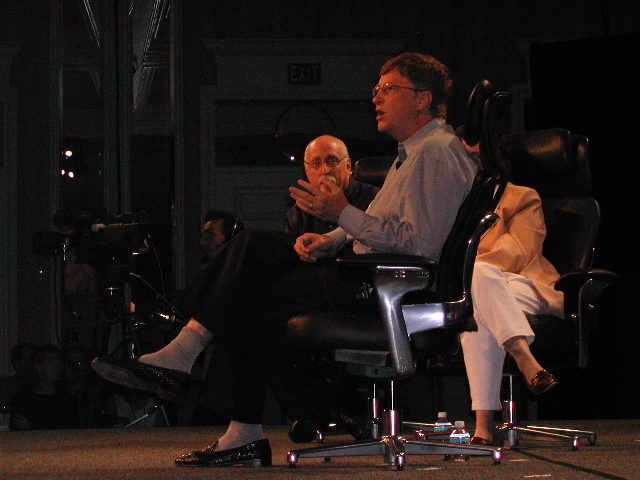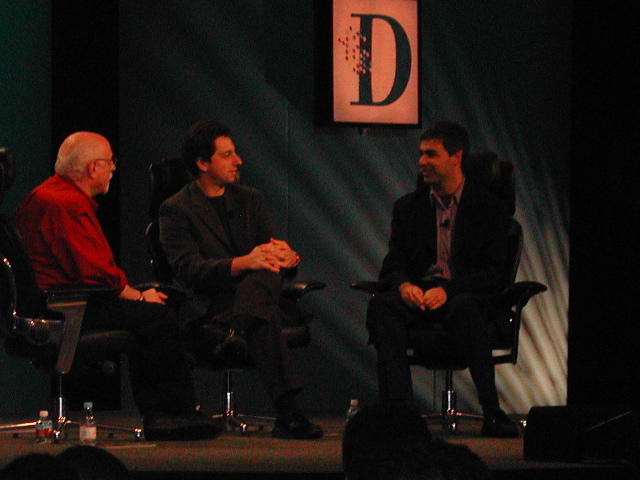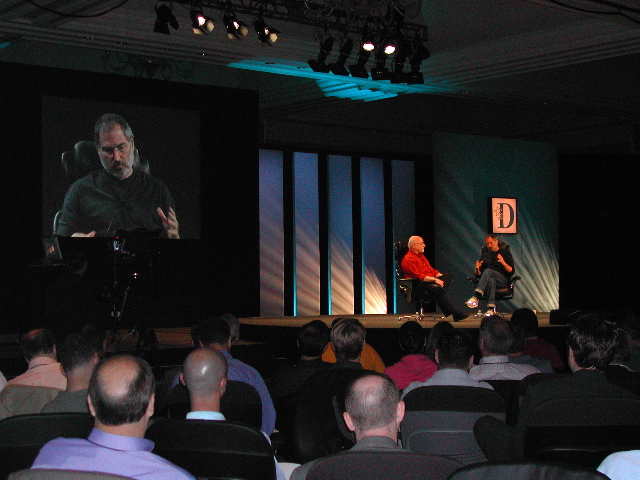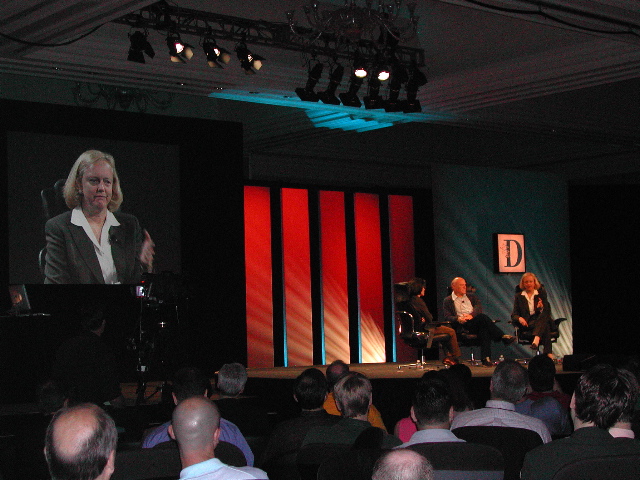Friday, May 30, 2003
D: Interview With Steve Jobs
The following are my notes from the May, 28, 2003 interview with Steve Jobs, conducted by Walt Mossberg at D: All Things Digital. (Despite their format, please don't mistake these jottings for a verbatim transcript or a complete portrayal. They are necessarily paraphrased and incomplete. That said...)
Interview (intro music, Beatles, "Revolution")
M: You were there at the beginning if the PC era.
J: '77, Apple II.
M: Where are we in the arc of this?
J: The PC is interesting in the way it has morphed. First, there were the hardware hobbyists, the PC served the software hobbyists. Dan Bricklin and Bob Frankston, who's here, invented the first spreadsheet. Lots of productivity growth, but people were speaking of the PC's demise in the early '90's. Then the Internet came along. At Apple we feel there's a third great age of the PC coming, where it becomes your digital hub. Cameras, music: it's becoming central to the digital lifestyle.
M: (to audience) He makes a music player, you guys know that?
J: You need screen real estate to do things like a music store. Portable devices are not perfect for everything, even with 'Net connections.
M: The market share for Apple has not increased dramatically; why?
J: We ask ourselves that a lot. (Audience laughs.) We serve three primary markets: consumers, education and creative professionals. The pro market has been suffering economically for the last few years, same with education. We've more than doubled our share of the consumer market, it's now between 5-10%.
M: A lot of people think given the success you've had with portable devices, you should be making a tablet or a PDA.
J: There are no plans to make a tablet. It turns out people want keyboards. When Apple first started out, "People couldn't type. We realized: Death would eventually take care of this." "We look at the tablet and we think it's going to fail." Tablets appeal to rich guys with plenty of other PCs and devices already. "And people accuse us of niche markets." I get a lot of pressure to do a PDA. What people really seem to want to do with these is get the data out. We believe cell phones are going to carry this information. We didn't think we'd do well in the cell phone business. What we've done instead is we've written what we think is some of the best software in the world to start syncing information between devices. We believe that mode is what cell phones need to get to. We chose to do the iPod instead of a PDA.
M: How many iPods have you sold?
J: We passed the 700,000 mark recently, will probably sell 1 million by some time this summer.
M: Do you have plans for movies on the iPod?
J: I'm not convinced people want to watch movies on a tiny little screen. To paraphrase Bill Clinton, "It's the music, stupid, it's the music!" Music's been around for a long time, will continue to be, it's huge. Not speculative, a real tangible market.
M. Why were you the company that was the last to figure out MP3s?
J: Apple invented FireWire. Then, the only company that forgot to put it in something was Apple. We addressed that with iMovie, and we saw that the brass ring was to be able to create a DVD. We were the first ones out with that. This music thing happened on the side when weren't paying enough attention.
M: Apple was associated with piracy in the recent past.
J: Yes, the slogan was "Rip. Mix. Burn." Some industry executives—who did not have teenagers living at home—thought this meant "rip off." They went to Washington, held us up in effigy. That's not what it meant. It meant rip it to your hard drive. We care deeply about video editing, we care deeply about music. When we did the iPod, we thought this thing could be the coolest thing in the world, and it also could be a theft shuttle. So we crippled it.
M: You could say you crippled it for an honest person. You walked a middle path.
J: We did, we crippled it in a modest way. If you want to get around it, you can. I guarantee you, there's a way to hack anything.
M: Were you looking ahead toward working with the labels?
J: That crossed our minds. (Audience laughs.) We understand about intellectual property issues. We make software.
M: Why did the labels do a better deal with you for the Music Store?
J: The content industry and the technology industry never have understood each other. They're like ships passing in the night. One of the greatest achievements of Pixar was bridging this divide. One of the most important things record companies do is pick which of 500 people will be the next Sheryl Crow. If they don't do that well, the rest of it doesn't matter. It's not surprising that they didn't understand Napster, or that distributing content over the 'Net was going to be big. We approached them initially and they said go away. About nine months ago, we began talking to them about this middle path. One of the things that appealed to them about Apple was its smaller percentage of the market, its control over hardware and software, its ability to be sued.
M: (Suggests that Jobs demonstrate the Music Store.)
J: How many people have never seen the iTunes Music Store, show of hands? (About 1/2 the room. Jobs gets up and demos the Music Store.) It's important and unique to make it easy for a user to find and organize her music library. (Funny moment when software wouldn't recognize Jobs' password. Demonstrates one-click song purchase.)
M: If your seven year old gets on this and starts downloading, you're hosed.
J: Well, you've got a lot of great music.
M: What happens if you upload it to Kazaa?
J: Songs will only play on three Macs, so it won't be very interesting.
J: (Shows how fun it is to look up all the alternate versions of an old classic like "One for the Road:" Willie Nelson, Billie Holiday, Bette Midler, Frank Sinatra. You always hear about how mesmerizing Jobs is as a speaker and presenter. It's especially apparent as he cycles through these versions of "One For The Road." His joy in the coolness of the software is palpable and infectious. Demos the "browse by genre" feature. Pulls up Barry Manilow's "Copa Cabana" at Walt Mossberg's request, because he says it's Kara Swisher's favorite.)
M: By the end of the year, everyone's going to have something like this. Microsoft, Real. What happens when everyone has it?
J: Maybe these guys are a lot smarter than us, they probably are. But it's really hard to get the rights you need from the labels, it's really hard to write the software, and you need a usable jukebox. We'll find out, but I think it might be a little harder than it seems.
Audience Questions
Audience member: Where are we when it comes to speech as a user interface?
J: Speech has always been five years away. Most of the smart people in the field I know have gotten out of it. Even 1% error drives you nuts. Everyone has groups working on it, but it doesn't look like it will be real anytime soon.
Audience member: Does Apple plan an equivalent of a breakthrough application like the Music Store for Wifi/wireless?
J: We've sold a lot of WiFi products. We were the first to ship 802.11g earlier this year, and this is clearly the next standard due to its compatibility. We've built it into the computers and software so it's seamless.
M. Except in this room. (Audience laughs. I keep typing and suppress a growl.)
Audience member: Much of the music industry's growth has come from unwanted bundling. It would seem that that industry is heading for a huge leg down on that front.
J: That's the conventional wisdom but I don't think it's true. Over 1/2 the tracks the Music Store has sold were bought as part of complete albums.
M: Do you think the high rate of album purchases is just a function of what people are used to?
J: My personal belief is a significant share of the songs being sold still will be albums. Until now, you could only buy about 20% of a record label's inventory because most of the catalog wasn't on the record store shelves. I expect that the catalogs are going to be worth a lot.
Audience member: What would you do if you were seventeen and starting over?
J: (Jobs talks a bit about his diverse interests, especially at that age.) Intellectually the most exciting thing to me is bioscience.
Audience member: Has Apple thought about finding a way to make medical information more accessible and personal?
J: No, but that's interesting and something our industry hasn't paid enough attention to.
Audience member: What has been your hardest decision in last six years?
J: Letting people go is always the hardest. When I came back to Apple, it was in tough shape, and we had to change the management team. Fortunately, there have been no big recent layoffs, we've decided to innovate our way through this downturn.
(Next up: Meg Whitman and Barry Diller.)
D: Dinner With Bill Gates
D came out swinging on Tuesday evening with Walt Mossberg's and Kara Swisher's dinner interview with Bill Gates (and my trusty blogwallet was close at hand). All of my posts on the substance of the conference talks will consist of the highlights that caught my highly selective, unsophisticated, imperfect and incomplete notice. Please take them with a whole shaker of salt, and whatever you'd like to pour it on (for me, lately, that would probably be ice cream).
The Introduction
The conference opened with some remarks including an observation from Walt Mossberg that the Internet now is in place almost like an electrical grid, ready to power a host of different things. Spotlit, black and white portraits of the speakers were arrayed on all sides of the room, as Walt said, "like Red Square." This began a recurrent joke from the stage, characterizing these folks as "the Heros of Socialist Labor."
Next was an utterly hilarious and star-studded video short that took its cue from VH1's "Behind the Music." "Behind the Technology" began with a tongue-in-cheek tribute to the MITS Altair, which "lit a young industry on fire," and boasted revolutionary features and cutting-edge industrial design (great commercial parody with the Altair spinning along in a row of indigo iMacs). Moving on to DOS, with a ringing endorsement from P-Diddy, who (who knew?) apparently is a big fan. "It's a terrible operating system, but musically very interesting." Fond reminiscences of Microsoft Bob ensued, as well as great footage of Steve Ballmer channeling a home shopping/infomercial huckster. Cue the Internet, and two of the video's funniest moments. Mark Andreessen: "Yes, I invented the browser—since then, nothing." This was followed by the characterization of Bill Gates as an Internet pioneer, and Gates: "It was especially clear after everyone had already gone there." (That was all I took down from the video, but keep an eye out for it if the WSJ should make it available; it's well worth checking out.)
The Interview
Mossberg, Swisher and Gates began by discussing the current environment in the technology industry. Gates mentioned strong growth and advances in several areas like microprocessors, optic fiber and LCD tech, and his perception that in general the pace of innovation is being underestimated. They asked about GUIs and whether we are due for a new way to use a computer. Gates commented the idea is to simplify a number of concepts and make certain features central and uniform. Layout, presentation and usability need to be taken to a new level. They asked where these and other new developments will come from, and Gates said they're more likely to flow from long-term research at either companies or universities. The PC was an enormous leap forward, and we're unlikely to see something as dramatic again, but digital ink, speech recognition and Web services are big steps. Microsoft is increasing its r&d budget 15% (there was a funny moment when Gates tried to do the math and figure out how much this means they're spending) and investing and doing partial ownership deals with Comcast and other companies to encourage adoption of Broadband. Korea is "it" when it comes to broadband these days, Korea Telecom has a single sign-up, nationwide service.
Getting back to the growth areas Gates mentioned, Mossberg asked, "What the hell are Web services?" Gates mentioned a CEO conference last week where, in trying to explain the same thing, he showed how a spreadsheet could be created that would link seamlessly with the Amazon site. Web services is about connecting applications together, and it's the infrastructure needed for ecommerce. Today, phone, email and faxes still are the dominant means of commercial communications. Describing XML, Gates mentioned the ability to do customized sourcing (he didn't say it, but I was thinking news aggregators). When Mossberg suggested this would all run on a proprietary Microsoft platform, Gates was quick to say no, the XML movement is founded on the idea of total interoperability and open standards. He mentioned WS-I, the Web Services Interoperability Organization. Web services represent a sea change in the way data is moved within organizations as well. On the ecommerce side, it's not about comparison shopping. The real dream of ecommerce is yet to be realized.
The discussion moved on to Tablet PCs. To Gates, it's common sense these things will become pervasive. Mossberg and Gates went back and forth about whether the interface is easy or cumbersome. Gates: "A lot of people learn the pencil before they use the keyboard."
This then led to WiFi. Gates said if you're designing products today, you're designing for WiFi and quality service for audio and video. They asked about the effect of WiFi on the way cell phone services are priced. Gates called cell phone service pricing "truly ridiculous." He posited that over the next five years WiFi will become very mainstream, a complement to how people get broadband. He mentioned that having another approach to delivery of wireless services probably is a good thing.
They briefly discussed Microsoft's P2P chat and music app, Three Degrees. (Yeah, I hadn't heard of it either. Here are some reviews, etc. courtesy of Google.) General discussion of what's up with MSN, what services make it compelling. Gates mentioned projects to make files accessible on any machine, provide automatic back-ups and family scheduling (sounds very .Mac-y, to me).
They asked what Gates thinks of current developments in online music delivery. Gates responded that the big question is whether anyone will cut into piracy's 90% share of the market. The fact that record companies have cut deals on more liberal terms for Apple's Music Store is a step forward.
They discussed the Gates foundation, and Gates identified its primary goals on an international scale as health oriented. "Malthus was more than wrong, he was the opposite of right." Better health care equates to lower birth rates. It's premature to think about trying to solve digital divide issues in countries with health concerns that must take precedence.
Swisher asked what Gates would go into if he were seventeen years old and starting over today. Gates mentioned that the artificial intelligence field has never really delivered on its potential, and in the next few decades there's the possiblity of a breakthrough there. He's also interested in bioscience, and being someone who could reason about biology would be good.
The session concluded with questions from the audience. (A note about the audience questions throughout the conference: the illustriousness of the audience members often rivaled that of the speakers. My apologies for not immediately recognizing more of the questioners. For example, Steven Levy asked several questions, but never having seen him in person before I didn't realize that until later.) One audience member inquired whether Gates perceived the open source movement as a threat. Gates responded that we will always have free software and commercial software. Microsoft is always comparing its products to comparable open source offerings to make sure its products have value. (I was reminded of Dave Winer's recent "Who Will Pay?" pieces: part I, part II). Another audience member asked why Microsoft decided to license SCO Unix. Gates replied that Microsoft has Unix servers for Windows, and wants to be able to match whatever you could get from a straight Unix solution. Someone else asked about Placeware. This is an application that makes it easy to create an IP session to do meetings. Will involve integration with office training capabilities. MIT is using it for university training. Others can build on the Placeware APIs.
The final question from the audience concerned motivation, what keeps you engaged, interested, doing what you're doing? Hearkening back to the earlier exchange about the Tablet PC interface, Gates said it's to read a Walt Mossberg column that raves about a Microsoft product. In a more serious vein, he said that the dream born 25 years ago has not yet been achieved. Technology is not as easy and cheap as it could be, not yet the ultimate tool. There's nothing more fun than working in this industry.
More to come from the Wednesday sessions...
Thursday, May 29, 2003
D Blogs, D Blogs!
Another blogger who made it to D: All Things Digital: David Hornik of VentureBlog has this initial report, and, like me, has more to come. Here's D's Technorati Link Cosmos.
D: 'nouncements
From D: Real Networks announced "the lowest per-burn price available to U.S. consumers through any of the new generation of digital music services," at $.79 per track (that's on top of the $9.95 monthly subscription). Real's Rhapsody service is discussed in this Washington Post article and this Slashdot thread.
Palm, Inc. unveiled plans for integrating voice over IP (VoIP), various WiFi partnerships, and new measures for securing wireless data transmissions.
Done (Almost)
D concludes this morning. Since I stuck around for a lively dinner last night, my notes still need to be transformed into something legible (I almost said "into something it won't pain you to read," but I won't make that kind of promise!). This event has exceeded my expectations on every front. The interview sessions have been extraordinary, and the audience is packed with some of the most important thinkers, writers and businesspeople of our time (academia is represented here too, but not well enough; perhaps D could use a "scholarship" program). To say that the copyright panel crackled is accurate but does not do it justice; John Battelle of bIPblog may have more for you on that before I do, so watch that space, and check back here late today for my wrap ups.
Wednesday, May 28, 2003
Letting Them Do Their Thing
The interview with Sergey Brin and Larry Page was the highlight among a series of highlights thus far, IMHO. I have a sheaf of notes and dying Powerbook batteries, will do cleanup and posting tonight. In the meantime, see Dave Winer, Donna Wentworth (blogging at Weblogs at Harvard) and John Palfrey from OSCOM (with WiFi!). (There's a mirror in front of me as I write this, reflecting Jack Valenti back at me.)
The D Goes On
Thanks so much for all the kind emails and comments about my "delicate condition!" The lack of WiFi access here continues to be limiting. (Per the organizers, they don't want the entire room checking email during the presentations.) These photos are being uploaded courtesy of the Macs in the lobby. Another blogger in residence: Esther Dyson.
D

Bill Gates at D.
D kicked off last night with a reception, dinner and an interview with Bill Gates, who from his deft, direct and cogent handling of prickly questions about things like open source and Web services left me thinking he's been hanging out with Robert Scoble. I took sporadic notes which I may try to write up later. There is, however, no WiFi at D (a fact which drew low hisses from the crowd and promises of an explanation—yet to come—when it came up). Correction: the hotel is drenched in Wayport access, but I'm not sure it's possible to get on even if you prepay. Ironic to say the least, given that much of the discussion last night focused on planning and designing for ubiquitous and cheap wireless Internet access. Surreality check: the simultaneous view from my table of Bill Gates addressing the crowd and Steve Jobs and Steve Case reacting.
The supremely classy Dan Gillmor is here, as is Mitch Kapor, so I'd keep an eye on their pages as well. Here's the schedule for today's speakers:
8:00 a.m. to 10:30 a.m.: Steve Jobs; Barry Diller, Meg Whitman; Dr. Richard Klausner
10:45 a.m. to 12:15 p.m.: Terry Semel; Larry Page, Sergey Brin
1:45 p.m. to 4:15 p.m.: Ted Leonsis, Mark Cuban; Hilary Rosen, Jack Valenti, Rob Glaser, Joe Kraus, Dennis Mudd; Norm Pearlstine
4:30 p.m. to 6:00 p.m.: David Pottruck; Steve Case
Tuesday, May 27, 2003
Because What You Really Want Is Another Set-Top Box
The Los Angeles Times has an interesting story today about Disney's on-demand movie service, MovieBeam, and why despite what sound like some smart sounding features—a hard drive that will store about 100 movies at a time; the ability to pause and rewind—this dog is unlikely to hunt. ("Disney Is Thinking Inside the Box")
"So now you're going to feel a little pressure..."
I'd call for a drumroll for this announcement, if you weren't just as likely to mistake it these days for the sound of me lumbering into the room. By which I mean, I've been blogging for two here at B&B for the last several weeks. How many? Good question. (Despite there being ample reading material about the rigors of pregnancy, no one provides sufficient warning of the utterly confounding math.) Something like 11. Or 13. I figure I'll just keep covering squares until I get Baby Bingo. That's scheduled for December 6. We're finally telling the world, so I thought I'd, uh, tell the world. More later; D tonight!

This is my magazine rack on Baby.
Any questions?
![]() Unless otherwise expressly stated, all original material of whatever nature created by Denise M. Howell and included in the Bag and Baggage weblog and any related pages, including the weblog's archives, is licensed under a Creative Commons License.
Unless otherwise expressly stated, all original material of whatever nature created by Denise M. Howell and included in the Bag and Baggage weblog and any related pages, including the weblog's archives, is licensed under a Creative Commons License.




